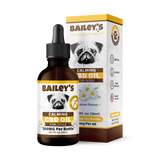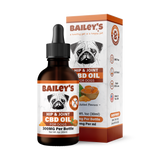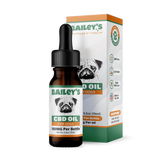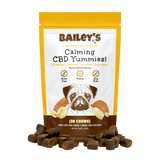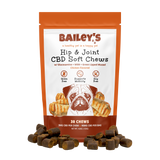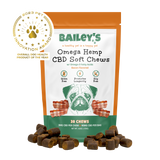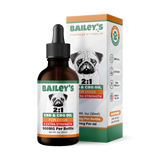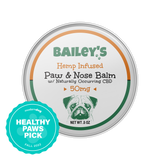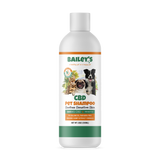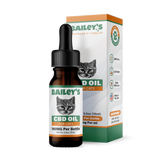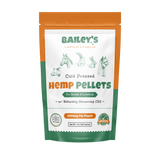Pepperoni and Cats: Feline Diet Warnings
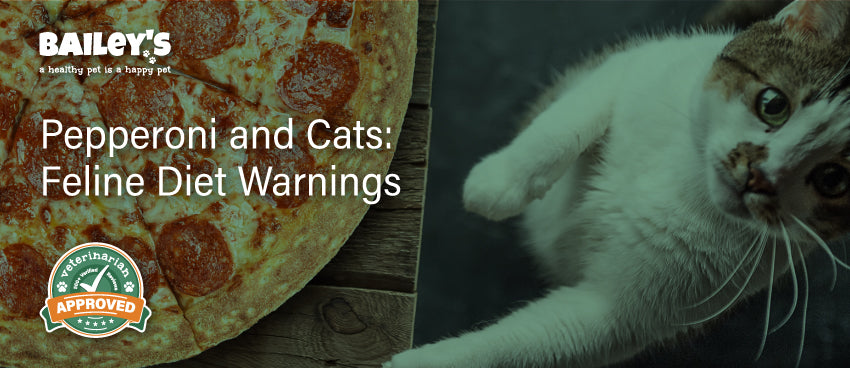
Pepperoni is a delicious and popular cured meat often used as a topping for pizza or incorporated into various dishes. However, when it comes to feeding our feline companions, it's essential to tread with caution.

Cats have unique dietary needs that must be met to ensure their health and well-being. With the help of our friends at Bailey’s CBD, we will explore the topic of pepperoni and cats, shedding light on the potential dangers and offering alternatives for cat treats.
Table of Contents
1. Understanding Feline Dietary Needs
Cats are fascinating creatures with unique dietary requirements. As obligate carnivores, their bodies have evolved to thrive on a diet primarily composed of animal-based protein. This means that their nutritional needs are quite different from those of humans and even other animals. To ensure optimal health and well-being for our feline friends, it is crucial to understand and meet their specific dietary needs.
When it comes to essential nutrients for cats, protein takes center stage. Cats require a high amount of protein to support their lean muscle mass, overall growth, and development. Quality animal protein sources, such as poultry, fish, and meat, should form the foundation of their diet. These protein sources provide the necessary amino acids that cats need to thrive.
In addition to protein, fatty acids play a vital role in a cat's diet. Omega-3 and omega-6 fatty acids are crucial for maintaining healthy skin, promoting a shiny coat, and supporting overall well-being. These beneficial fatty acids can be found in fatty fish like salmon and trout, as well as in certain plant oils. Including these sources in a cat's diet can help keep their skin healthy and their coat lustrous.
Taurine is another essential nutrient for cats. This amino acid is found exclusively in animal tissues and is crucial for proper heart function and vision. Cats cannot synthesize taurine on their own, so it is important to ensure an adequate intake through their diet. Taurine deficiency can lead to severe health issues, including heart problems and vision impairments.
Vitamins and minerals also play a crucial role in a cat's overall health. Cats require specific vitamins and minerals, including vitamin A, vitamin D, calcium, and phosphorus, to maintain healthy bones, teeth, and overall cellular function. These nutrients can be obtained through balanced commercial cat food or raw diets under veterinary supervision. Ensuring that cats receive these essential vitamins and minerals is essential for their long-term health and well-being.
1.1 Foods Cats Should Avoid
While it is important to understand what cats need in their diet, it is equally important to know which foods to avoid. Some common foods that can be toxic or detrimental to cats include:
- Onions and garlic: These ingredients can damage a cat's red blood cells, leading to anemia. It is best to avoid feeding cats any foods that contain these ingredients.
- Chocolate: Chocolate contains theobromine, which is toxic to cats. Even small amounts can cause symptoms such as vomiting, diarrhea, rapid breathing, and even seizures.
- Caffeine: Cats are highly sensitive to caffeine. Ingesting caffeine can cause tremors, elevated heart rate, and even seizures. It is important to keep all caffeinated products, such as coffee, tea, and energy drinks, out of a cat's reach.
- Grapes and raisins: These seemingly harmless fruits can be extremely toxic to cats. Even small amounts can cause kidney failure. It is best to keep grapes and raisins away from cats entirely.
- Alcohol: Alcohol consumption can have severe consequences for cats. Even a small amount can result in severe neurological issues and liver damage. It is crucial to keep all alcoholic beverages securely stored and away from curious feline companions.
By understanding the unique dietary needs of cats and being aware of the foods they should avoid, we can ensure that our feline friends lead healthy and fulfilling lives. Providing a well-balanced diet that meets their nutritional requirements is a fundamental aspect of responsible cat ownership.
2. The Dangers of Pepperoni for Cats
Unfortunately, pepperoni falls into the category of foods that should be strictly off-limits for cats. The ingredients and preparation methods used in this popular cured meat can pose significant risks to our feline friends.
Pepperoni is a beloved food for many humans, but it contains harmful ingredients that can have adverse effects on cats. Let's take a closer look at why pepperoni should never be given to our furry companions.
2.1 Harmful Ingredients in Pepperoni
Pepperoni typically contains high levels of sodium, fat, and various spices. Additionally, it is often preserved using nitrates and nitrites, which have been linked to an increased risk of certain cancers in humans. These ingredients can be particularly harmful to cats, given their unique metabolism and sensitivity to certain substances.
Sodium, in particular, is a major concern when it comes to pepperoni. Cats have a low tolerance for sodium, and excessive consumption can lead to serious health issues. The high sodium content in pepperoni can put a strain on a cat's kidneys and contribute to the development of hypertension or other cardiovascular problems.
Furthermore, the fat content in pepperoni is a cause for concern. Cats require a balanced diet that is low in fat, and consuming fatty foods like pepperoni can lead to weight gain and obesity. Obesity in cats can have a range of negative consequences, including an increased risk of diabetes, joint problems, and a reduced lifespan.
2.2 Health Risks Associated with Cats Consuming Pepperoni
Feeding pepperoni to cats can lead to several health issues, ranging from mild gastrointestinal upset to more severe consequences. Some potential risks include:
- Upset stomach: The high-fat content of pepperoni can cause digestive disturbances, leading to vomiting or diarrhea in cats. This can be uncomfortable for the cat and may require veterinary intervention to resolve.
- Pancreatitis: The excessive fat content in pepperoni may trigger inflammation of the pancreas, a condition known as pancreatitis, which can be potentially life-threatening for cats. Pancreatitis can cause severe abdominal pain, loss of appetite, and lethargy.
- Sodium overload: As mentioned earlier, the sodium content in pepperoni can put a strain on a cat's kidneys and contribute to the development of hypertension or other cardiovascular problems. Cats are more susceptible to these issues compared to humans, making pepperoni a dangerous choice for their diet.
- Obesity: Regular consumption of fatty and calorie-dense foods like pepperoni can lead to weight gain and obesity in cats. Obesity in cats not only affects their overall health but also puts them at risk for various other conditions, including diabetes, arthritis, and respiratory problems.
It is essential to prioritize the health and well-being of our feline companions by providing them with a balanced and appropriate diet. While it may be tempting to share our favorite foods with them, it is crucial to remember that what is safe for us may not be safe for them. When it comes to pepperoni, it is best to keep it far away from our cats and opt for cat-friendly treats instead.
3. Recognizing and Responding to Dietary Distress in Cats
Cat owners must be vigilant in monitoring their pet's behavior and protecting their well-being. Cats cannot communicate directly about their dietary distress, so it's essential to recognize the signs and take appropriate action promptly.
3.1 Symptoms of Dietary Issues in Cats
Some common signs that indicate potential dietary distress in cats include:
- Vomiting or diarrhea
- Loss of appetite or refusal to eat
- Excessive grooming or hair loss
- Lethargy or lack of energy
- Changes in litter box habits
3.2 Immediate Actions to Take
If you suspect that your cat is experiencing dietary distress, it's crucial to act promptly to prevent further complications. Here are some immediate actions you can take:
- Remove access to the problematic food: If you suspect that pepperoni or any other ingredient is causing distress, ensure your cat can no longer access it.
- Provide fresh water: Make sure your cat has access to clean and fresh water to stay hydrated.
- Monitor symptoms: Keep track of any changes in behavior or symptoms and consult with your veterinarian.
- Contact your veterinarian: If your cat's symptoms persist or worsen, consult with your veterinarian for a professional evaluation and tailored advice.
4. Alternatives to Pepperoni for Cat Treats
While pepperoni may be off-limits for cats, there are plenty of alternative cat treats that are safe and enjoyable for our feline friends.

4.1 Healthy Homemade Cat Treats
Consider making homemade cat treats using ingredients that are suitable for feline consumption. Some examples of homemade cat treats include cooked chicken or fish, freeze-dried meat or fish, and small pieces of cat-safe fruits or vegetables like cucumbers or blueberries. Always make sure to research the specific ingredients before incorporating them into your cat's diet and consult with your veterinarian if you have any doubts.
4.2 Store-Bought Treats: What to Look For
If you opt for store-bought treats, read the labels carefully and look for products specifically formulated for cats. Ensure that the treats are made from high-quality ingredients with no harmful additives or fillers. It's also important to remember that treats should only make up a small portion of your cat's overall diet and should not exceed the recommended daily intake.
5. Consultation with a Vet for Feline Diet
When it comes to providing your cat with the best possible diet, consultation with a veterinarian is highly recommended. Regular check-ups with a skilled professional can ensure that your cat's nutritional needs are being met and any specific dietary requirements are addressed. Your Veterinarian can also help you identify high-quality supplements to improve your cat’s well-being.
5.1 Importance of Regular Vet Check-ups
Veterinarians have the knowledge and experience to assess your cat's overall health and make recommendations tailored to their specific needs. They can help you devise a balanced diet plan, taking into account factors such as your cat's age, weight, activity level, and any existing health conditions.
5.2 Tailoring Your Cat's Diet Based on Age and Health
As cats transition through different life stages, their dietary needs evolve as well. Kittens, for example, require more frequent feeding and specific nutrients to support their growth. Older cats may benefit from diets formulated to support joint health or manage weight. By working closely with your veterinarian, you can ensure that your cat's diet is optimized to promote their overall health and well-being.
6. Conclusion
In conclusion, it's important to prioritize the health and dietary needs of our feline companions. While pepperoni may be tempting to share, it poses potential risks to cats due to its high fat, sodium, and spice content. By understanding the unique nutritional requirements of cats and being mindful of the ingredients in their food and treats, we can provide them with a safe and wholesome diet. Remember, consultation with a veterinarian is always a valuable step in optimizing your cat's nutrition and ensuring their long-term well-being.

